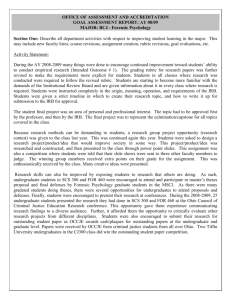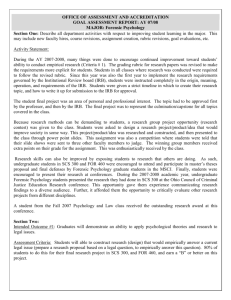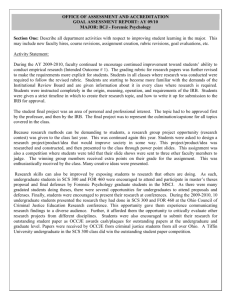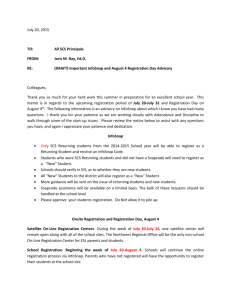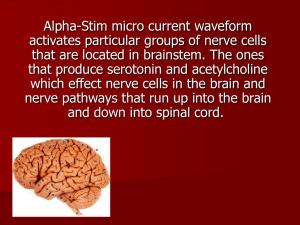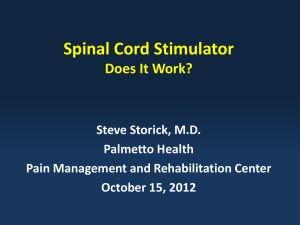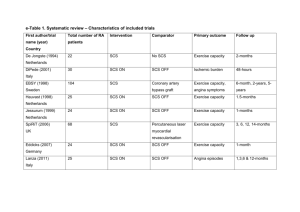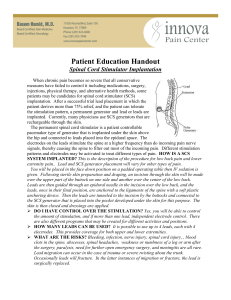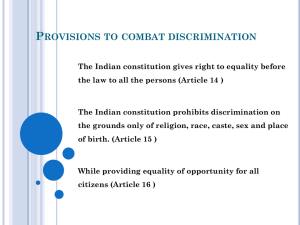Report
advertisement
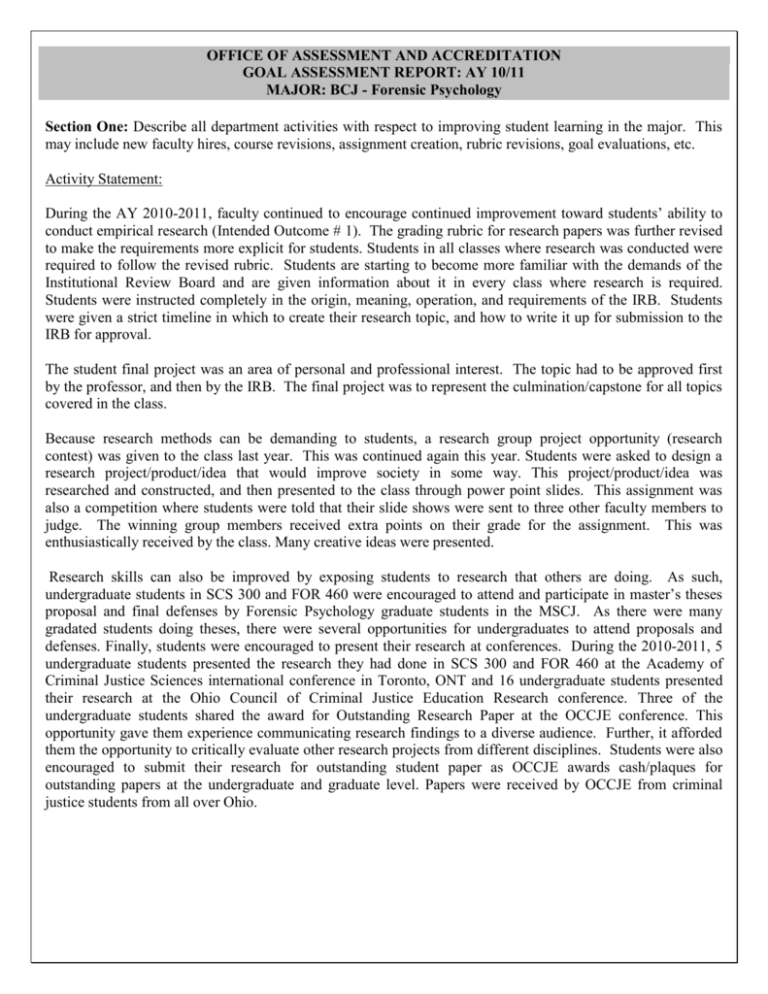
OFFICE OF ASSESSMENT AND ACCREDITATION GOAL ASSESSMENT REPORT: AY 10/11 MAJOR: BCJ - Forensic Psychology Section One: Describe all department activities with respect to improving student learning in the major. This may include new faculty hires, course revisions, assignment creation, rubric revisions, goal evaluations, etc. Activity Statement: During the AY 2010-2011, faculty continued to encourage continued improvement toward students’ ability to conduct empirical research (Intended Outcome # 1). The grading rubric for research papers was further revised to make the requirements more explicit for students. Students in all classes where research was conducted were required to follow the revised rubric. Students are starting to become more familiar with the demands of the Institutional Review Board and are given information about it in every class where research is required. Students were instructed completely in the origin, meaning, operation, and requirements of the IRB. Students were given a strict timeline in which to create their research topic, and how to write it up for submission to the IRB for approval. The student final project was an area of personal and professional interest. The topic had to be approved first by the professor, and then by the IRB. The final project was to represent the culmination/capstone for all topics covered in the class. Because research methods can be demanding to students, a research group project opportunity (research contest) was given to the class last year. This was continued again this year. Students were asked to design a research project/product/idea that would improve society in some way. This project/product/idea was researched and constructed, and then presented to the class through power point slides. This assignment was also a competition where students were told that their slide shows were sent to three other faculty members to judge. The winning group members received extra points on their grade for the assignment. This was enthusiastically received by the class. Many creative ideas were presented. Research skills can also be improved by exposing students to research that others are doing. As such, undergraduate students in SCS 300 and FOR 460 were encouraged to attend and participate in master’s theses proposal and final defenses by Forensic Psychology graduate students in the MSCJ. As there were many gradated students doing theses, there were several opportunities for undergraduates to attend proposals and defenses. Finally, students were encouraged to present their research at conferences. During the 2010-2011, 5 undergraduate students presented the research they had done in SCS 300 and FOR 460 at the Academy of Criminal Justice Sciences international conference in Toronto, ONT and 16 undergraduate students presented their research at the Ohio Council of Criminal Justice Education Research conference. Three of the undergraduate students shared the award for Outstanding Research Paper at the OCCJE conference. This opportunity gave them experience communicating research findings to a diverse audience. Further, it afforded them the opportunity to critically evaluate other research projects from different disciplines. Students were also encouraged to submit their research for outstanding student paper as OCCJE awards cash/plaques for outstanding papers at the undergraduate and graduate level. Papers were received by OCCJE from criminal justice students from all over Ohio. Section Two: Intended Outcome #1: Graduates will demonstrate an ability to apply psychological theories and research to legal issues Assessment Criteria: Students will able to construct research (design) that would empirically answer a current legal issue (prepare a research proposal based on a legal question, to empirically answer this question). 80% of students to do this for their final research project in SCS 300, and FOR 460, and earn a “B” or better on this project. (D – Critical Thinking / D – Career Readiness – Program Specific) Results of Outcomes Activity: 2010-2011 Met/Not Met Not Met Data Details 75% of the students received a B or better Intended Outcome 2: Understand the psychological impact of crime and violence on victims Assessment Criteria: 80% of students in the FOR 105, and FOR 460 classes to receive a “B” (85%) or better on the final exam. (D – Career Readiness – Program Specific) Results of Outcomes Activity: 2010-2011 Met/Not Met Met Data Details 80% received a B or better Intended Outcome 5: Diagnose mental disorders and understand different approaches to treatment by constructing ITPs. Assessment Criteria:: 80% of students to be able to correctly complete a set ITPs (final project) at a grade of “B” or better in PSY 362 and COR 430. (D – Career Readiness – Program Specific) Results of Outcomes Activity: 2010-2011 Met/Not Met Met Data Details 85% of students received a B or better on the ITP project in FOR 430. Not measured in PSY 362. Section Three: Describe analysis of assessment data and action plans for upcoming academic year. Analysis and Action Plans: One of the goals in the 2009-10 action plan was to work with the math department on the revision of MAT 273. As it existed, the content of the course did not place much emphasis on hypothesis testing. The course did not cover some of the most common statistical tests that students need to use on their research projects. Thanks to a collaborative effort, the Math department agreed to change the Minimum Course Content Guidelines for MAT 273 to better prepare students in the social sciences for data analysis with their research projects. Specifically, the Minimum Topic Outline now includes “Statistical significance and hypotheses testing for one and twosample t tests, ANOVA, and Chi-square.” Research concepts and skills are difficult for students to master. The goal for BCJ Forensic Psychology majors is for them to learn the fundamentals of the research process in SCS 300 and complete an empirical research project. By the time students reach Psychology and Law, they have had previous experience conducting research and writing up reports. They refine their research skills by conducting a second research project, specifically related to Forensic Psychology, in FOR 460. Regardless of how well students master the research concepts in SCS 300, the experience of conducting research is invaluable to subsequent performance at a higher level. This is why SCS 300 is a prerequisite for FOR 460. Previous OA data clearly showed that students benefit from increased exposure to, and experience with, this material as performance on research projects in FOR 460 are superior to those conducted in SCS 300. Every year there have been a few exceptions to the SCS 300 prerequisite in FOR 460 with students who take the two courses concurrently. Within the process of writing their research papers, both in SCS 300 and FOR 460, students experience the greatest amount of difficulty in the analysis and presentation of their statistical results. Students rely heavily on assistance from faculty teaching these research courses in order to successfully analyze and interpret their data. Based on this analysis, the following recommendations are made in AY 09/10 for use in AY 10/11: (1) Reinforce the use of SCS 300 as a prerequisite to FOR 460. Advisors need to stress to their advisees that SCS 300 needs to be taken during the junior year. Since this course is now offered during both the fall and spring semesters, this should be easier for students to accomplish. (2) Revise this specific objective with an emphasis on measuring student improvement between the SCS 300 and FOR 460 classes. This can, in part, be accomplished by tracking the performance of students in FOR 460 and comparing the quality of their work done in that course to the coursework done for SCS 300. Students can also do this by incorporating research projects and preparing for research conferences during the summer.. There are often opportunities for students to then present their research from SCS 300 at conferences held in the early Fall (one example being the Midwest Criminal Justice Association (MCJA) meeting ). (3) Develop a one hour lab course to accompany SCS 300 that would focus on computer applications (i.e., Excel, SPSS) in analyzing and presenting statistical results. There would also be an emphasis on the proper reporting of results in research papers as well as communicating for conference presentations. Now that recommendation # 2 has been achieved, in AY 10/11, the idea of the one hour lab can be explored. Also in AY 10/11, work needs to be done on developing a mechanism of identifying the Forensic Psychology majors in the Research Design courses. This will enhance the validity of the measured criteria and make possible the implementation of the criteria that gauges improvement in research skills in major as they progress from SCS 300 to FOR 460.
